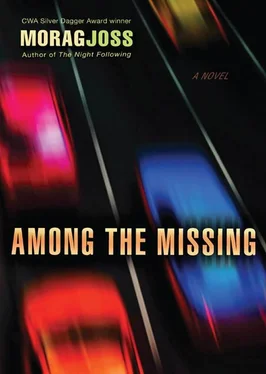
I watched her sleeping. I knew her exhaustion was real as soon as we were inside the trailer because the first thing she did was pull off her boots. Nobody who’s planning to attack and rob you would do that. She crawled onto the bed, and her eyes were closing even before she had shrunk herself away into the covers. Soon her shivering stopped, but she lay for a long time with her eyes closed before she fell asleep. So I watched her sleeping out of wariness that I knew there was no real need for, but wariness was a habit with me.
She wasn’t clean, but I also knew about that. I knew the hopeless filth of people accustomed to months without hot water and soap and a proper, safe space to be undressed and attend to themselves. I’d seen plenty of that on the journey to here, and after a while that loss of pride doesn’t wash off at all. It wasn’t the same as the swift, dismaying layer of dirt on someone like her, unable to wash for a single day and a night.
And in fact there’s a third way homeless people go, and that’s the labored cleanliness of people like me, encamped in run-down places, condemned buildings, damp trailers, people who will lug buckets and light fires to heat water and scrape their skin raw and wear their clothes out with scrubbing. We’re the ones who are terrified that the dirt and shame that encroach on illegal lives might touch ours. She wasn’t like that, either. She was used to keeping clean easily and had never thought that having the means to do so might be a luxury. She was stained by sudden and brief deprivation, and as I watched her sleeping, I wondered why.

My name isn’t Annabel. But at that moment I needed a new name and I hadn’t until that instant thought what it would be. I still wasn’t thinking when I blurted out Anna . My mouth opened in a panic and produced a sound almost involuntarily, and it was a natural pair of syllables to utter in those circumstances, I do believe that. I didn’t choose to say it. But it was the obvious association to make, stumbling toward the trailer with Anna’s mother’s arm around my shoulder, her kind, sad face looking at me like that. And although it was also unthinking-and not a piece of deliberate and hasty disguise-to add the -bel , it was also necessary, for the time being, to conceal that I knew anything about her daughter and Stefan. I would have to go into it all later, but I knew I was about to collapse. I had to get inside and lie down, and I couldn’t start to explain it then. But of course there was more to it than that.
My mother died of a particular sorrow, which was that she took the life of a child. In a drawer in our house there was a photograph of the child, a baby girl. In the picture were also the child’s mother, Marjorie Porter, holding a cup and saucer, and my mother, Irene, with her teacup on her lap and one hand on the crucifix in the hollow of her throat. At the time Irene was forty-one, a year younger than I am, come to think of it. The women were in deck chairs on a patch of grass in a back garden; the ground around them was studded with floppy clumps of lettuce and lined by long fringes of carrot tops. In the background through a fence you could see the next-door garden sprouting the same rows of vegetables, the same pointed towers of bean plants climbing up bamboo frames; these were clearly the gardens of neighbors who shared packets of seed and swapped cuttings. A curl of smoke rose from a cigarette that rested in an ashtray on a kitchen chair beside the women. Next to the chair stood a man in suspenders holding a garden sieve up to his face and laughing through the mesh into the camera. His face couldn’t be seen very well, but he was certainly my father.
What was also certain was that they were in the Porters’ garden and not ours, for there on a rug in front of Marjorie was five-month-old Annabel, all baby jowls and bandy baby legs and puffy baby feet, wearing ballooning, frilly pants and a sundress and bonnet. Marjorie’s face as she looked down at her child was weary, eternal, transparent; motherly love had opened her out, and had also laden her forever with its ballast of implications: responsibility, fertility, continuity, and all their warm, perplexing weight, their proud, dull glow. Even knowing what was about to befall her, I envied her that. (At the time I still had the photograph to look at, I believed I would never have a child myself.) The picture had captured her in new motherhood, before all this knowledge had reduced her to mereness, to that dumpy, overlooked category of numberless, undifferentiated mums. Actually, on that day, in her sleeveless dress and lacquered beehive hairdo, she looked less maternal as well as a whole generation, rather than the actual sixteen years that separated them, younger than my tightly permed and dirndl-skirted and still childless mother, whose sharp, wing-framed spectacles had caught a ray of sun and trapped her eyes as though behind small, blazing mirrors. Marjorie’s husband, Mr. Porter, whose first name I never knew, must have taken the picture. It was probably his cigarette in the ashtray.
The strangest thing about any old photograph is it is all containment, all ignorance. My parents and Mrs. Porter happy and joking on the second or third day of a heat wave: of course they had no idea what was coming, how could they? Their unawareness is the most tremendous thing in the picture. I used to scan their faces for a flicker of fear assailing any of them as they posed in the blinding sun; I searched for one of those microscopic, momentary twitches of dread that can descend on someone on a summer’s day, the dread that nothing can last. I never found it. If only they could have remained there forever, in their grainy, bordered ignorance, clicked and shuttered into rectangular place by Mr. Porter’s Box Brownie, trimmed and untouchable; if only they would not be propelled, in the coming days, into the imprisoning, defining series of events that would capture and frame them in their misery for as long as they lived. And of course, in that picture, they knew nothing whatsoever about me, for there was nothing yet to know, least of all that I was, in my way, in it with them. I thought that strange, too, that I could be conceived yet not conceived of , and this was not egotism on my part but a regret that I was powerless to turn them all in another direction altogether, even though I was there . I longed to shake them all alive again and make everything come out differently. But my wish was futile, and perhaps also paradoxical; my mother would have claimed that I could only have come alive to have such a wish because what happened did happen.
When Anna’s mother put her blanket around my shoulders and drew me against her, I was begging her silently to ask me nothing more than my name. She didn’t. When I got into the trailer, everything seemed very simple. I had no strength left, and I lay down. I knew I would sleep before long, but I lay with my eyes closed for a while, wondering about the name I had given myself-Annabel-and about the photograph.
I didn’t have it anymore. I had put it along with everything else on a bonfire in the back garden, the same garden beyond the fence in the background of the picture, though the fence had long since been replaced by an ornamental cinder-block wall. I had been in a hurry to be done with my father’s things and get going; in three weeks I would be married. I had watched the trembling air above the flames suck the photograph upward, curl and blacken it into weightless fragments of ash, and I had been impatient with myself for noticing at all that it was fragmenting away to nothing in the very place it depicted, our back garden captured in Kodachrome more than forty years before. But I hadn’t let myself ponder any further on my strange in utero status in it, both invisible and present, or on the absence in it of any omen of the tragedy into whose tainted echoes and rhythms I would be born and grow up. I just watched it burn, and I trusted it to disappear.
Читать дальше














